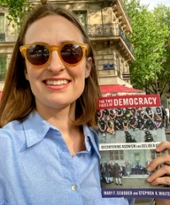New Book Explores “Two Faces of Democracy”

Mary F. (Molly) Scudder, Associate Professor of Political Science at Purdue, and coauthor Stephen K. White, University of Virginia, tackle the question of how to defend democracy against anti-democratic forces in their new book, "The Two Faces of Democracy: Decentering Agonism and Deliberation" (Oxford University Press, 2023). The book asks, how should defenders of democratic life respond to threats to democracy? Should those concerned use a strategy of conflict and resistance or more civil and deliberative strategies?
One of the crucial takeaways from the book is that both conflict and reasoned debate are central to democracy. Here, Scudder and White contribute to ongoing debates between deliberative democrats and agonistic democrats. Deliberative democrats emphasize the importance of compromise and reasoned discussion when making collective decisions. But these approaches can sometimes downplay structures of injustice that undermine civil discussion. Agonism prioritizes contestation, conflict, and standing up to one’s political opponents, especially to fight injustice. But this orientation toward conflict runs the risk of eroding key democratic commitments. Agonism can’t ensure that this conflict always stays within democratic bounds.
In their book, Scudder and White assert that both traditions, which they refer to as the "two faces of democracy," play a crucial yet limited role in understanding what democracy requires of citizens. As Dr. Scudder explains, “Democracy is as much about moments of opposition and resistance (think the Boston Tea Party) as it is about moments of reasoned debate and compromise (think the Constitutional Convention).” Rather than try to reconcile these two traditions, they highlight their tensional congruence.
The book project began Dr. Scudder and Dr. White exchanged papers in spring 2020. Dr. Scudder was writing a paper defending deliberative democratic theory, while recognizing some of its limitations, especially in response to agonistic critics. Dr. White’s paper investigated how valuable insights of agonism were actually being undermined by some framings of that tradition. “We began talking and realized that each of our papers pointed to the need for a fuller understanding of what we call the two faces of democracy.”
Dr. Scudder notes the real-world implications of the book. “We pull examples from history as well as the front pages of the newspaper. Examples of the real-world relevance of our work include debates over ‘civil discourse’ and the appropriateness of various protest movements.”
Last year, she wrote an article in the Washington Post using this research to evaluate claims that the January 6 attack on the capitol was within the bounds of “legitimate political discourse.” “Inherent in those claims is the idea that opposition, even violent opposition, can be legitimate and democracy-enhancing. As we show, resistance can play a part in the struggle for a healthy democratic future. But it must be set within a larger framework of cooperation and justification.” Their book defends what they take to be the normative core of democracy: the promise of equality and autonomy. They show how these two democratic values must be understood in relation to one another.
Dr. Scudder just returned from Paris, France where she spent the semester as a visiting scholar at CEVIPOF, the Centre for Political Research at Sciences Po. “Living in France during the protests that followed both pension reform and the police killing of Nahel M. confirmed the importance of understanding the role of resistance and conflict in democratic life.”
Currently, she is working on a new project on the expectations of democratic citizenship. Among other things, she considers what is a reasonable amount of political participation to except of people.
She is also guest-editing a special issue of Political Communication on the topic of democratic listening, which is related to her first book, Beyond Empathy and Inclusion: The Challenge of Listening in Democratic Deliberation (Oxford University Press, 2020).